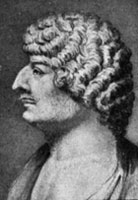A Hymn To Love Poem by Robert Herrick
A Hymn To Love
I will confess
With cheerfulness,
Love is a thing so likes me,
That, let her lay
On me all day,
I'll kiss the hand that strikes me.
I will not, I,
Now blubb'ring cry,
It, ah! too late repents me
That I did fall
To love at all--
Since love so much contents me.
No, no, I'll be
In fetters free;
While others they sit wringing
Their hands for pain,
I'll entertain
The wounds of love with singing.
With flowers and wine,
And cakes divine,
To strike me I will tempt thee;
Which done, no more
I'll come before
Thee and thine altars empty.
great poem i like it very much i vote 10+++++++++++++++++++++++++++++
Robert Herrick was baptized on 24 August 1591. Only 15 months later, his father, Nicholas, died after committing suicide. After graduating St. John's College at the University of Cambridge in 1614, Robert entered Trinity Hall, where he studied law and received his bachelor's degree in 1617 and the master, in 1620. As a disciple of Ben Jonson and a chaplain of the Duke of Buckingham, Robert received some holy orders, in 1623. Later, he became a vicar of Dean Prior, in Devonshire. Unfortunately, in 1647, during the Great Rebellion, he had to leave his position because of his Royalist sympathy. Herrick lived at Dean Prior until he died, in1674. He has never married, and some of the women mentioned in his poetry are not real. His most important work is Hesperides. He published more than 1200 poems, including epistles, eclogues, epigrams, and love poems. Herrick used the classical Roman style of poetry preferring pastoral themes about the English country life. His most memorable poems refer to alluring sirens. Living between Puritans and feeling the wrath of the priest’s sermon, Herrick started to imagine a lot of mistresses to use a detailed intimacy while composing his poems. An example is Corinna, an adventure woman who reminds the reader ''that tomorrow isn’t guaranteed and even when it does arrive, you’ll be one day closer to your last tomorrow.'' He tried to enhance the beautifulness through using the contrast while ranging from disarray to carelessness, through the stimulation of sensual craving, through the celebration of the innocent nature of the poetic muse, and especially through the sexual imagery and hyperbole, also, through the spiritual symbolism. An example of contrast is his attitude in front of love suffering, '' Love is a thing so likes me, / That, let her lay/On me all day, /I'll kiss the hand that strikes me.'' His hyperbole is revealed in the verses, ''That I did fall/To love at all''.He is capable of accepting all the torments of love, until falling from the holy state of being. Then, he describes the dimension of love, ''Since love so much contents me.'' Moreover, he suggests the deepness of love suffering, ''The wounds of love with singing.''He ends the poem using the symbolism to describe the absence of God in that hellish spiritual, still, human space, ''Thee and thine altars empty.'' I mention, in this sense, the first stanza of the poem ''To the Virgins, Make Much of Time'', ''Gather ye rose-buds while ye may: Old Time is still a-flying; And this same flower that smiles to-day, To-morrow will be dying.''
Intense cry for love very much infectious. Love the words brings the intoxication to be loved. Thanks to the poet, at least the poet wanted to love and to be loved.
I'll kiss the hand that strikes me... thanks for posting....
This poem has not been translated into any other language yet.
I would like to translate this poem
fantastic, i love this poem.can you add me so that we chart pls?